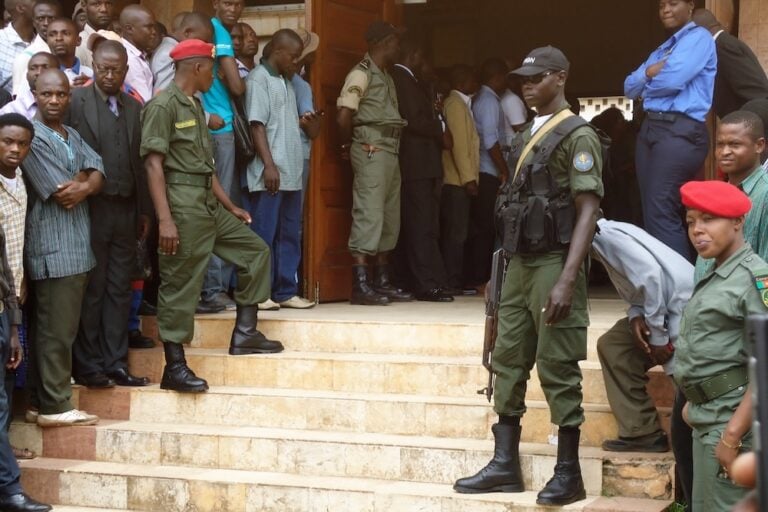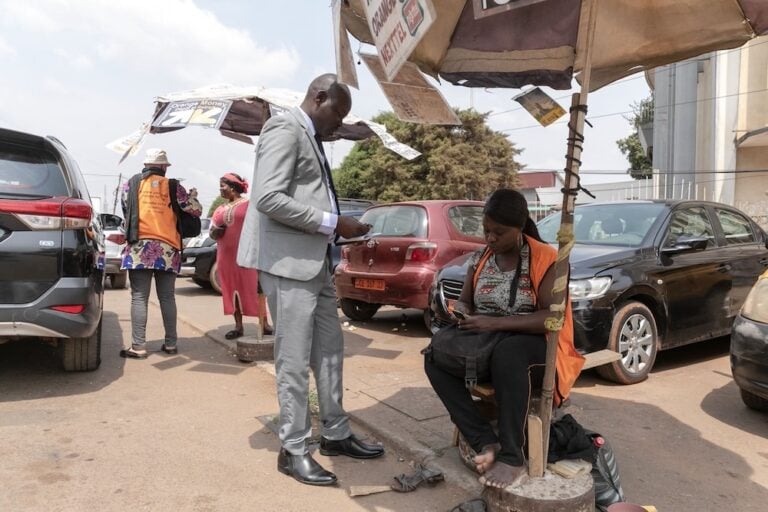(WiPC/IFEX) – The WiPC protests the three-year prison sentence and exorbitant fine imposed on the well known singer-songwriter Lapiro de Mbanga (real name Pierre Roger Lambo Sandjo) on 24 September 2008 for allegedly taking part in anti-government riots. Mbanga is known as an outspoken critic of the government, both as a songwriter and an opposition […]
(WiPC/IFEX) – The WiPC protests the three-year prison sentence and exorbitant fine imposed on the well known singer-songwriter Lapiro de Mbanga (real name Pierre Roger Lambo Sandjo) on 24 September 2008 for allegedly taking part in anti-government riots. Mbanga is known as an outspoken critic of the government, both as a songwriter and an opposition party member. The WiPC fears that the sentence is connected to his critical lyrics and, as such, is in violation of his right to freedom of expression. It calls on the Cameroonian authorities to release Mbanga immediately and unconditionally.
On 24 September, almost six months after his arrest and detention, Mbanga (51) was found guilty of taking part in riots against the high cost of living in Cameroon in February and sentenced to three years in prison. The songwriter was convicted of three of the six charges against him: “complicity in looting, destruction of property, arson, obstructing streets, degrading the public or classified property, and forming illegal gatherings”. He was also ordered to pay a fine of 280 million CFA francs (approx. US$640,000) to the Société des Plantations de Mbanga (SPM) company and the Ministry of Finance as compensation for damage caused during the riots. The charges against Mbanga are widely held to have been made in retaliation for his criticism of the government. The verdict was met with stunned silence, according to one press report.
Claims that the case is politically motivated have been denied by the government. Mbanga has been detained since his arrest on 9 April on the basis of his alleged role in the February mass demonstrations and strikes. However, some reports have indicated that his presence during the protests was merely a pretext, and his arrest was in fact linked to a song he wrote entitled “Constipated Constitution” which warns President Biya of the dangers of controversial constitutional amendments (see below). Mbanga’s wife has denied that he took part in the riots and maintained that he had actually calmed people down and prevented them from burning down Mbanga town hall. Some evidence to this effect was reportedly presented in court during the trial.
Mbanga was reportedly convicted on the grounds that, as a local traditional leader, his presence during the protests had galvanised the rioters. It was further argued that he would not have been allowed to film the events, as he did, had he been an outsider. This therefore made him an accomplice. However, according to local press reports, the riots were widely televised and none of the journalists who filmed the footage have been brought to trial. Moreover, Mbanga’s sentence, almost six months after the events in question, is twice that received by the actual authors of the riots, who were handed 18-month prison terms the month after the riots and subsequently received a presidential pardon.
Following his conviction, Mbanga was taken, in chains, to Nkongsamba principal prison to serve his term. His health has reportedly deteriorated as a result of the six months he has already spent there. It is said that he has been denied medical attention and the food and sanitary conditions in prison are poor.
Mbanga’s defence is appealing the verdict.


